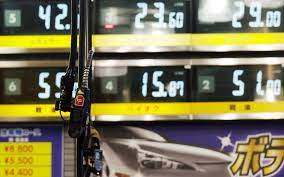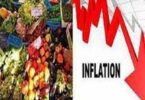TOKYO (Reuters): Japan’s government is considering extending until year-end fuel subsidies to keep gasoline prices below 180 yen a litre and is working on a separate budget to finance this measure, three people with direct knowledge of the matter said on Tuesday.
The sources, who declined to be identified because they were not authorised to speak to the media, said details of the proposal were being discussed by officials from the ruling Liberal Democratic Party (LDP) and its ally Komeito.
Finance Minister Shunichi Suzuki declined to comment about the proposal. “We must achieve the both aim of reviving the economy and restoring public finances,” he told reporters.
Last week, Prime Minister Fumio Kishida instructed ruling party officials to consider steps to extend the fuel subsidies which were introduced in January 2022 to help ease cost of living pressures.
Toshimitsu Motegi, the secretary general of the LDP, also told reporters the party was seeking to implement an extra budget in autumn to finance any extension.
Gasoline prices have been rising steadily in Japan due to the weaker yen and higher global prices.
Extending the subsidies would make it difficult for the government to achieve Kishida’s aim of bringing the primary budget balance, which excludes new bond sales and debt servicing costs, into the black by the fiscal year ending March 2026.
The government has said that it could achieve a primary budget surplus by the following fiscal year, with a deficit of 1.3 trillion yen in the target year.
INLFATION RATE
Earlier, it was reported last week that core inflation in Japan’s capital slowed in August for the second straight month but remained well above the central bank’s 2 per cent target, keeping policymakers under pressure to phase out decades of massive monetary stimulus.
The data for Tokyo, which is seen as a leading indicator of nationwide trends, adds to recent signs of broadening inflationary pressure in the world’s third-largest economy.
The Tokyo core consumer price index (CPI), which excludes volatile fresh food but includes fuel costs, rose 2.8pc in August from a year earlier, against a median market forecast for a 2.9pc gain. It slowed from a 3.0pc rise in July and exceeded the Bank of Japan’s 2pc target for the 15th straight month.
Analysts expect inflation to keep slowing in coming months reflecting recent declines in commodity prices and the base effect of last year’s sharp rises.
But an index that strips away both fresh food and fuel costs, which is closely watched by the BOJ as a better gauge of broad price trends, held steady at 4.0pc in August, highlighting the risk of inflation remaining stubbornly high, analysts say.
“Inflation likely peaked in June but isn’t slowing as much as expected, suggesting that companies aren’t done raising prices,” said Yoshiki Shinke, chief economist at Dai-ichi Life Research Institute.
“The outlook depends largely on whether consumers can continue to weather price hikes. It’s very hard, probably even for the BOJ, to predict the future path of inflation.”
While government subsidies drove down utility bills, food and daily necessities continued to see prices rise such as a 9pc jump in those for seafood and a 15.5pc gain for toilet paper.
While much slower than a 4.0pc year-on-year rise in goods prices, services costs were up 2.0% in August after gaining 1.9pc in July, the data showed.
A spike in global commodity prices last year drove many Japanese companies to shed their aversion to price hikes and pass on higher costs to households, keeping inflation above the BOJ’s target for longer than policymakers initially expected.
The inflation overshoot led the BOJ to make modest tweaks to its bond yield control policy last month, a move investors saw as a shift away from decades of ultra-loose monetary policy.
But Governor Kazuo Ueda has ruled out the chance of an early exit from ultra-loose policy, saying that it needs to wait until wages rise enough to keep inflation sustainably around 2pc.
Kishida on Tuesday unveiled plans to cushion the blow from rising prices that is likely to include an extension to gasoline and utility subsidies that expire in September – a move that will weigh on inflation.
The BOJ has said it is focusing more on trend inflation that strips away one-off factors, such as government subsidies to curb rises in gasoline and utility bills, deciding policy.
Several indices seen as key gauges of trend inflation hit record highs in July, heightening the case for a retreat from decades of ultra-loose monetary policy.







